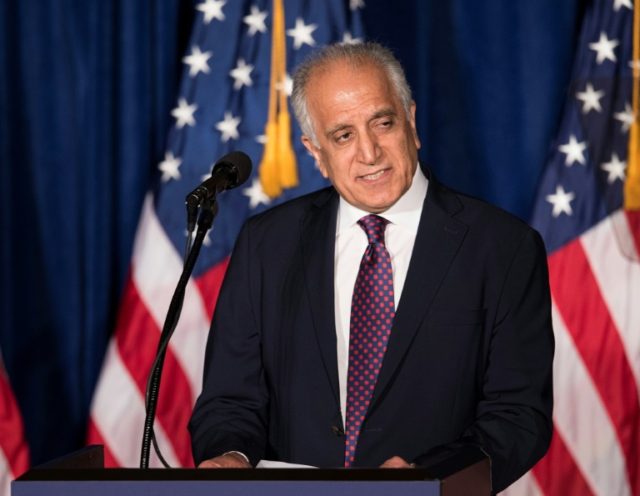The longest round yet of peace talks between the U.S. and the Afghan Taliban ended in Qatar on Tuesday with a draft agreement on two issues — the withdrawal of American troops and assurances from the terrorist group that Afghanistan will not harbor international jihadis such as its ally al-Qaeda, the top negotiator from the United States revealed on Tuesday.
U.S. President Donald Trump has signaled a willingness to pull American troops out of Afghanistan as part of a final peace pact, but his administration has indicated it plans to leave behind a residual force to ensure the Taliban keeps its promises, a proposal that the terrorist group has rejected.
After two weeks of Qatar-based negotiations, President Trump’s Afghan reconciliation envoy overseeing the talks with the Taliban said on Tuesday that the two sides have fleshed out a draft agreement on the two thorny issues.
U.S. presidential envoy Zalmay Khalilzad did not provide any details about a timeline of the troop pullout. However, recent reports revealed that the Pentagon was planning to offer to withdraw American troops within three to five years. The Taliban rejected that offer, demanding that foreign forces leave in one year.
In a series of posts on Twitter, U.S. presidential envoy Zalmay Khalilzad revealed on Tuesday:
Peace requires agreement on four issues: counter-terrorism assurances, troop withdrawal, intra-Afghan dialogue, and a comprehensive ceasefire. In January talks, we “agreed in principle” on these four elements. We’re now “agreed in draft” on the first two.
…
When the agreement in draft about a withdrawal timeline and effective counterterrorism measures is finalized, the Taliban and other #Afghans, including the government, will begin intra-Afghan negotiations on a political settlement and comprehensive ceasefire.
…
My next step is discussions in Washington and consultations with other partners. We will meet again soon, and there is no final agreement until everything is agreed.
(1/4) Just finished a marathon round of talks with the Taliban in #Doha. The conditions for #peace have improved. It’s clear all sides want to end the war. Despite ups and downs, we kept things on track and made real strides.
— U.S. Special Representative Zalmay Khalilzad (@US4AfghanPeace) March 12, 2019
After making the negotiated reconciliation between Kabul and the Taliban the top goal of its strategy to end the war, the Trump administration intensified peace-seeking efforts in recent months.
Echoing Trump’s envoy in a statement about the conclusion of the latest round of negotiations, Zabihullah Mujahid, a Taliban spokesman, declared:
This round of talks saw extensive and detailed discussions taking place regarding two issues that were agreed upon during [the] January talks. Those two issues were the withdrawal of all foreign forces from Afghanistan and preventing anyone from harming others from Afghan soil. …Progress was achieved regarding both these issues.
The Taliban has reportedly demanded that the word “terrorist” and its variants are excluded from the text of a potential peace pact.
Although the Pentagon recently claimed the Taliban has distanced itself from al-Qaeda — the terrorist group responsible for the Sept. 11 attacks — the United Nations recently described the relationship between the two groups as “long-standing” and “strong,” adding that the international terrorist organization “continues to see Afghanistan as a safe haven for its leadership.”
In October 2001, the United States invaded Afghanistan after the Taliban harbored the 9/11 perpetrators.
The Taliban still refuses to allow Kabul to participate in the negotiations despite U.S. insistence that the process is owned and led by the Afghan government. Taliban jihadis have long claimed they will negotiate with Kabul — which the group considers an American “puppet” — after foreign forces pull out of the country.
“It should be mentioned that no agreement was reached regarding a ceasefire and talks with the Kabul administration, nor were other issues made a part of the current agenda,” the Taliban spokesman stressed.
Taliban narco-jihadis are fighting to implement strict Islamic laws or sharia. The group generates most of its funding from trafficking and cultivating opium and its heroin derivative — some of which is fueling the historic number of fatal drug overdoses in the United States.
According to the U.N., the poppy plant trade in Afghanistan — the worlds top producer of opium and heroin despite nearly $9 billion in American taxpayer funding for counternarcotics since the war began — has continued “threatening stability” amid the ongoing peace talks.
It is unclear whether the U.S. will push the Taliban to stop dealing in opiates.

COMMENTS
Please let us know if you're having issues with commenting.